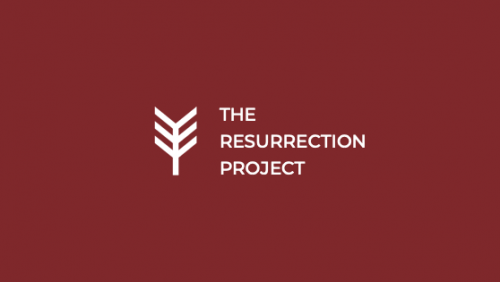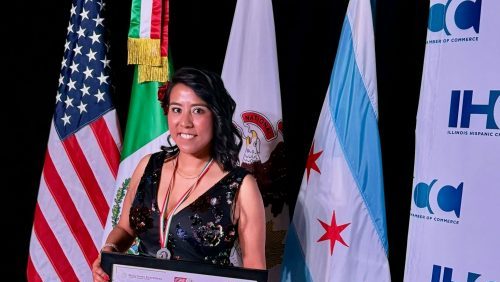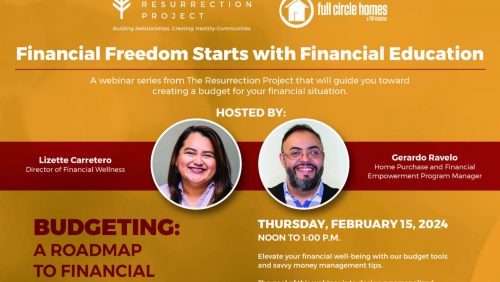Find Your New Home: Apartments Available for Lease. Click Here!
Empowerment through financial education for Latina women
Kiran Sood – Medill News Service Business Reporter Chicago
Published: July 1, 2009
For Cicero resident Leticia Franco, a single mother, a typical day includes working as a part-time cashier, caring for her 10-year-old son, and preparing for the GED exam she hopes to take this summer and that, once passed, will bring her closer to her long-term dream of becoming a registered nurse.
Franco, 27, took another important step toward achieving her goals earlier this year when she signed up for financial counseling sessions as part of a pilot program, Mujer Avanzando, that’s aimed at raising the financial literacy levels of single Latina mothers.
The courses, held at the Instituto del Progreso Latino in Pilsen, teach the women how to manage their money, build their budgets, and secure safe, affordable housing.
“If you look at statistics, the number of single mothers that have no skills, especially the Latina women, or have low education, it is very hard for them to get a job,” said Guadalupe Raymundo, financial counselor at the Resurrection Project, a community organization that offers services in the Pilsen neighborhood on Chicago’s South Side.
Single mothers now head 10 million homes nationwide, and their number is growing, according to a report released last month by the Chicago-based Eleanor Foundation, an advocacy group aimed at helping working women achieve economic independence.
In the Chicago area, including both the city and surrounding suburbs, single mothers head 39 percent, or 84,942 households, of which 49 percent are black, 25 percent are white and 23 percent are Latinas.
Up to 76 percent of single mothers in the Chicago region are employed—with 77 percent of those employed working 35 hours a week or more. Fewer than 10 percent receive public assistance, but nearly 40 percent of single mothers earn just $30,000 per year or less, the Eleanor Foundation study found.
Without the necessary tools and resources, these women, some of whom receive no child support and who dream of well-paying jobs and financial security, face barriers in achieving economic success for themselves and their families.
“They are here looking for something where they can excel in their education and provide a better education for their children, and break the cycle,” Raymundo said. “It is really important for them not only to discover the potential they have, but to also put it into practice.”
Financial literacy has become a hot-button issue in many communities that have been hard hit by the housing crisis, among them Cicero, Pilsen and Back of the Yards. In the city of Chicago, there were 99,488 foreclosure filings in 2008 – a 53 percent increase over 2007, according to RealtyTrac Inc.
Personal bankruptcies are also on the rise. According to the American Bankruptcy Institute, U.S. consumer bankruptcy filings rose 37 percent nationwide in May to 124,838 from the same period a year ago.
Money Smart Week, held by the Federal Reserve Bank of Chicago in April, featured more than 500 events, of which 40 were Spanish language discussions on topics including homeownership, foreclosure prevention, and personal finance.
More than 87,000 individuals participated in the weeklong series of events. Fourteen percent of the adult attendees were Hispanic, compared with 39 percent last year, said Alejo Torres, senior outreach program manager at the Federal Reserve Bank of Chicago, who was unsure of the reason for the drop in attendees identifying themselves as Hispanic.
For any community in which foreclosure is an issue, Torres said, financial education is increasingly important. He acknowledged that many individuals made mistakes, and some were misled.
“Financial products are becoming more and more complex every day,” Torres said. “Education has to be implemented across the board. People need to take action before they make big financial decisions; otherwise it is much harder to dig yourself out of a situation.”
Visa Inc. and the Chicago Fed co-sponsored the third annual Financial Literacy and Education Summit on April 20 to discuss financial literacy as a component of the solution to the global economic crisis.
“A year ago, [the issue] was suffering in darkness,” said Jason Alderman, director of financial education at Visa. “One by-product of the recession is that people have focused more on education. We want to make sure Americans can be resilient if another crisis hits.”
Back at the Instituto del Progreso Latino in Pilsen, Mayra Franco, 20, just completed her second week of courses. The oldest daughter of an unemployed single immigrant mother, Franco enrolled in the course after a friend told her it would help her build a budget, save money, and prepare for the higher education she dreams of achieving.
In addition to weekly attendance at the courses, she divides her time between part-time classes at Moraine Valley Community College in Palos Hills, working 35 hours a week as a cashier at a local store, her family at home, and spending time with her boyfriend. She aspires to attend college to study business management someday.
“I need help, I cannot do everything by myself,” Franco said. “I have problems doing my resume, I want to get a better job, and I want to know how I can get started saving money, and how they can help me get into a university.”
For women like Mayra and Leticia Franco, financial education programs are a stepping stone to a better life, and one they hope to pass on to their children.
“My son understands too, when I take him to day care..[that] he is helping me,” Leticia Franco said. “For him education is important, and he also wants his mother to have this important education as well.”



